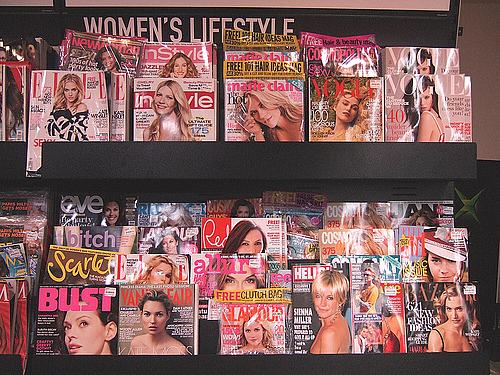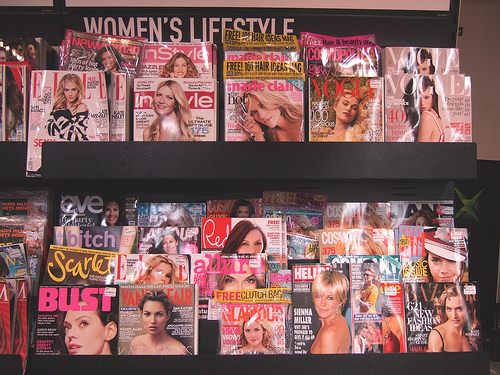Their So-Called Journalism, or What I Saw at the Women's Mags

 Editor's note: This is cross-posted with permission from Hillary Rosner's excellent Tooth and Claw blog at PLOS Blogs. What suggestions does she have for journalists facing similar situations? "I've butted heads with many editors at women's mags over the years, and I don't think I've once gotten my way," she wrote in an email. "So I think the only way to protect your story is to lay the ground rules ahead of time-which some freelancers might not be confident enough to want to try. But if I were to ever work for one of these magazines again, I wouldn't take an assignment without negotiating some things up front: no changing quotes, I have to see the final version of the story before it runs, I have the right to remove my byline if I feel the story has been altered so that its integrity (or mine) is in jeopardy, those sorts of things. I have no idea if any editor would agree to such terms. But that's the direction I think people need to move in."
Editor's note: This is cross-posted with permission from Hillary Rosner's excellent Tooth and Claw blog at PLOS Blogs. What suggestions does she have for journalists facing similar situations? "I've butted heads with many editors at women's mags over the years, and I don't think I've once gotten my way," she wrote in an email. "So I think the only way to protect your story is to lay the ground rules ahead of time-which some freelancers might not be confident enough to want to try. But if I were to ever work for one of these magazines again, I wouldn't take an assignment without negotiating some things up front: no changing quotes, I have to see the final version of the story before it runs, I have the right to remove my byline if I feel the story has been altered so that its integrity (or mine) is in jeopardy, those sorts of things. I have no idea if any editor would agree to such terms. But that's the direction I think people need to move in."
I've been needing to get this out in the open since the excellent Science Online 2012 session that Maryn McKenna and Elizabeth Devita-Raeburn organized, on writing about science for women's magazines.
A few years back, I went to Borneo to report on efforts to save the rainforest there, which people are hacking and burning into oblivion in the mad quest to grow oil palm trees. In the process, they're obliterating wildlife-including the orangutan, which is sliding toward extinction. Palm oil is ubiquitous in American life. It's in all sorts of processed foods-Oreos, Reese's Peanut Butter Cups, Ritz crackers, margarine-as well as soaps, make-up, and many other beauty products.
One destination on my Borneo trip was an orangutan sanctuary run by an incredible Danish woman, who was passionate and unflappable and very photogenic. Maybe, I thought, I could interest a women's magazine in a short profile of this woman, as a way to inform readers about the palm oil problem-which, despite sporadic publicity over the years, very few people seem to know about or understand. So I contacted a friend of a friend, a smart and lovely editor at a high-profile women's magazine that from time to time runs articles about strong women doing worthwhile work. Her reply was quick, honest, and upsetting: The magazine couldn't tackle the palm oil issue head on, because half its advertisers were beauty companies guilty of destroying the very same forests my Danish woman was trying to save.
Collectively, women's magazines-by which I mean the whole field, from fashion titles like Vogue and Elle to health publications like Self and Women's Health to the more general sex-and-diet-tips mags like Glamour or Cosmopolitan (does that even still exist?)-reach millions upon millions of readers each month. So the lack of willingness to cover globally important topics is dismaying. It's a colossal missed opportunity. That's why I was heartened to hear some success tales of writing about science for women's magazines, at the Science online session. Maryn and Elizabeth write frequently for women's mags and had largely positive experiences to share. I know enough about Maryn to know that she's a serious, sharp, ethical reporter. (I'm not familiar with Elizabeth's work, but I assume the same is true.) So clearly there's some solid journalism getting out there via women's mags.
But there are also some serious institutional problems, and these can lead to 1) lack of coverage of important topics, 2) less-than-completely-truthful coverage of important topics, and 3) complete and utter bullshit coverage of important topics. My experiences working for women's mags have been incredibly frustrating and disheartening-and I've long wanted to share them publicly but haven't, for fear of alienating potential clients. The absurdity of this is a testament to the tough economics of freelancing. Few experiences are so bad that we won't accept a lucrative repeat assignment when it's dangled in front of us. But as I started thinking back on some of my horror tales, spurred by the Science Online session, I realized I no longer give a shit. I feel like this stuff needs to air out.
A couple of years ago, with the economy tanking and magazine budgets going the way of orangutans, an editor at a women's magazine called me with an assignment. I'd already sworn off these mags forever after my last debacle but, as I was in no position to turn down $5,000 or whatever it was, I agreed. Anyway, this editor insisted that this was to be a serious science story (albeit written in the publication's from-one-girlfriend-to-another voice), for which I should conduct many interviews and extensively scan the literature. So I did.
It soon became clear that the editor had had a specific thesis in mind from the start, one that wasn't borne out by the research. Then one day I got an email saying the story was going to press that day, and could I please give it one last read to make sure it was okay. I was confused, as I hadn't been contacted by any fact-checkers. But upon reading it, I noticed a few instances in which scientists' quotes had been altered. The points they made were roughly the same, but the words simply weren't theirs.
That's not okay in serious journalism. When I asked the editor, she said the quotes had been tweaked for clarity, and that I shouldn't worry-that a fact-checker would read the quotes back to the scientists, and if the scientists weren't happy with the way they sounded, they could change their wording. Setting aside the ethics of this, I felt concerned for my own reputation. If I interviewed you, and then someone read you back your supposed quote, you would likely recognize immediately that the words weren't yours. And your immediate thought would be that I misquoted you, and am therefore a shoddy journalist. And you would rightfully decide not to speak to me again, and possibly tell your colleagues to do the same. As a freelance journalist, my reputation for professional integrity is paramount; take it away, and I'm just some girl with a laptop who likes to ask questions.
The editor and I had an email argument, I left her a voicemail, she never replied, and that was that; in the end, I think we just stopped communicating. I never saw the final version of the story and I tried to move on with other work and forget about it. A few months later, after the check came, I saw the magazine on the newsstand. I picked it up, saw my article in the table of contents, and put it back without reading it. I have no idea of the editor worked in her own spurious thesis, or what the researchers "said" in their quotes.
This was only the last of a string of bad scenes, though. I was told multiple times by editors at another women's mag to feed a source a quote-as in, "Can you call this source back and see if they'll make this specific point in these exact words?" These were stories about health, in a magazine women turn to for actual, truthful, information. (I refused.)
Years ago, another women's mag so badly mangled a story I'd done for them on young breast cancer survivors that one of the interviewees called me in tears. I hadn't yet seen the printed article, which had been cut down-without my knowledge-from a feature of several thousand words to a quarter page of little more than a "charticle," featuring four of the eight women I'd profiled, with nothing other than a thumbnail photo, a single quote, and their name, age, and how they'd learned of their illness.
And yet, the magazine had even bungled that. The tearful woman calling me was devastated because the magazine had completely altered the facts about how she'd discovered a lump in her breast.
I dialed my editor in despair, and she blamed it on the fact-checker.
This same story had begun with instructions to find a dozen breast cancer survivors under 35 who might be good candidates to profile, from which the editors would select the ones they wanted. Presumably, I thought, they'd select the women with the most interesting or relatable stories. After I sent the list to my editor, she told me to go back and ask each woman to send a photo. Like, a headshot. Because, I don't know, stories about unattractive cancer survivors don't sell?
I could go on, but remembering all this has made me need some bourbon. I'll just mention one more very quick thing, which is that for the first women's magazine story I ever wrote, the editor told me outright that if I couldn't find anyone who'd ‘fess up to the behavior that was supposed to be a trend (the whole point of the story), I was free to invent characters. For the record, I did not. And the story never ran because the real people I talked to just weren't outrageous enough. (This wasn't a science or health story, but nonetheless.)
I know that there are amazing and talented editors at these magazines who would love to publish an expose on palm oil, or a profile of a 27-year-old breast cancer survivor who doesn't look like a supermodel. But often their hands are tied-whether by advertisers or the institutional structure or the status quo. I think women who shell out hard-earned money to buy these magazines deserve better. They at least need to know that much of what they're reading isn't entirely true.
Or maybe I'm being naïve? Maybe the readers all know this already, and I'm the rube who's clinging to some goody-two-shoes rules. One thing seems clear, in any case: I probably won't be offered any more assignments by women's magazines.
Photo credit: jaimelondonboy via Flickr
